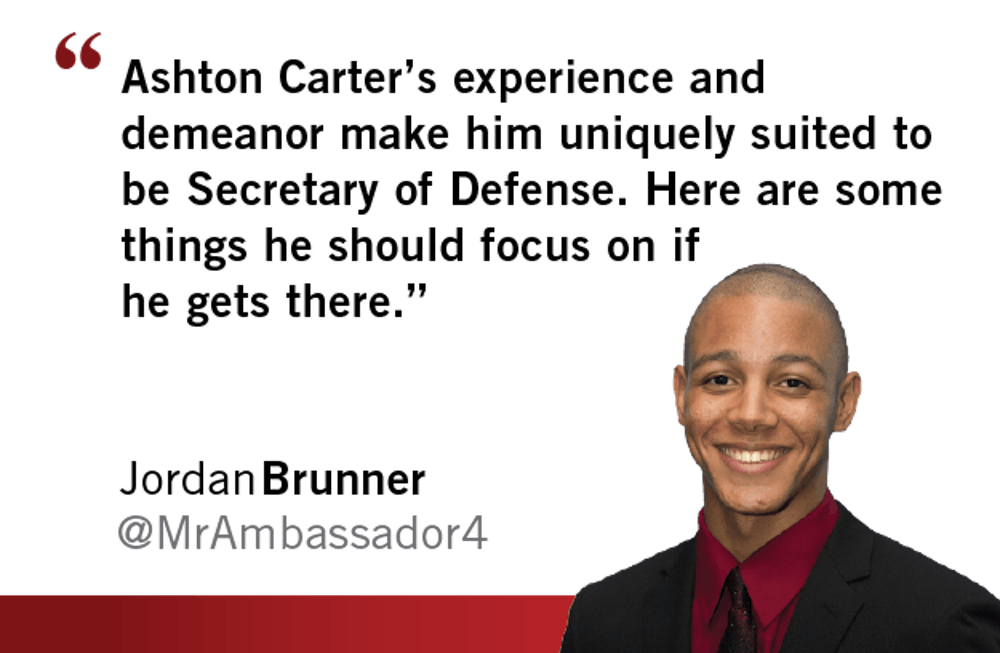Defense Secretary nominee Ashton Carter’s time in office will be just as effective, if not more so, than that of former Secretary of Defense Robert Gates, who served under both George W. Bush and Barack Obama. In both instances, the U.S. faced unprecedented threats and challenges to its national security. Like Obama with Gates, the next administration would be smart to keep Carter on.
If confirmed by the Senate, Carter must face issues from PTSD to sequestration. Here are the four defense issues on which he'll need to focus:
1. Cyber security and cyber warfare
Obama, through channels including his recent State of the Union address, made a commitment to improving our cyber capabilities and cyber security. Therefore, Carter will have to focus a great deal of attention on this issue, especially because we have already seen evidence that future wars would mainly be fought with cyber-capability or in cyberspace itself.
Carter should seek to accomplish two goals in relations to cyber: first, he should strongly recommend to Obama the reform and regulation of the military-civilian nexus that exists between the U.S. Cyber Command and the National Security Administration so that each entity has its own head.
Second, Carter should take a two-track approach to our cyber capabilities, assisting the President and Congress in creating a very secure environment for the United States while also focusing on cyber offense. In doing this, he should also limit and regulate the acquisition of “zero days” — vulnerabilities in a computer system that can be exploited by hackers in the event of an emergency — because this can work either in or not in our favor.
2. ISIS & AQAP
So far, the Obama administration has had a vaguely defined strategy in regards to ISIS. Its plan to “degrade and destroy” ISIS has not been accompanied by action other than an international coalition and air strikes, which are only effective to a point. Carter needs to develop a clear, comprehensive strategy recommendation to give to President Obama regarding the ISIS threat, that should include the addition of Joint-Special Operations Command and Special Forces teams on the ground in order to not only train Iraqi and Kurdish forces, but to help direct American firepower and missiles (as well as providing valuable intelligence and tracking the electronic communications of the enemy).
Carter also needs to institute a re-evaluation of the threat that Al-Qaeda in the Arabian Peninsula represents, both in terms of scope and type of threat. For the past few years, the U.S. intelligence and military personnel have been focusing on bombing plots from AQAP, which was why the Paris attacks that AQAP claimed responsibility for caught them off guard.
3. Targeted Killing/Armed Drone Policy
This is something that has been a recurring problem for the Obama administration, public opinion aside (the majority of Americans approve of Obama’s use of drones and targeted killings), due to its controversial legal nature and for a lack of transparency on the part of the Obama administration about who is being killed and why. It is also hurting our image abroad in other countries, and possibly creating a setback for our foreign policy goals.
Obama pledged to start moving control of drones which carry out targeted killings from the CIA to the Defense Department back in 2013. Carter needs to streamline this process, helping to move it forward as quickly and efficiently as possible in order to increase the transparency, oversight and defined legality of the strikes.
4. Pivot to Asia
Carter is definitely on board with Obama’s strategic “pivot to Asia.” Picking up where current Secretary of Defense Chuck Hagel leaves off, Carter needs to continue to strengthen the military ties to countries in that region while working closely with the State Department to ensure that his efforts are effective and in sync with the rest of the administration.
Carter looks like the smartest choice that President Obama could have made. Let’s hope he lives up to his reputation.
Reach the columnist at jbrunne2@asu.edu or follow @MrAmbassador4 on Twitter.
Editor’s note: The opinions presented in this column are the author’s and do not imply any endorsement from The State Press or its editors.
Want to join the conversation? Send an email to opiniondesk.statepress@gmail.com. Keep letters under 300 words and be sure to include your university affiliation. Anonymity will not be granted.
Like The State Press on Facebook and follow @statepress on Twitter.





